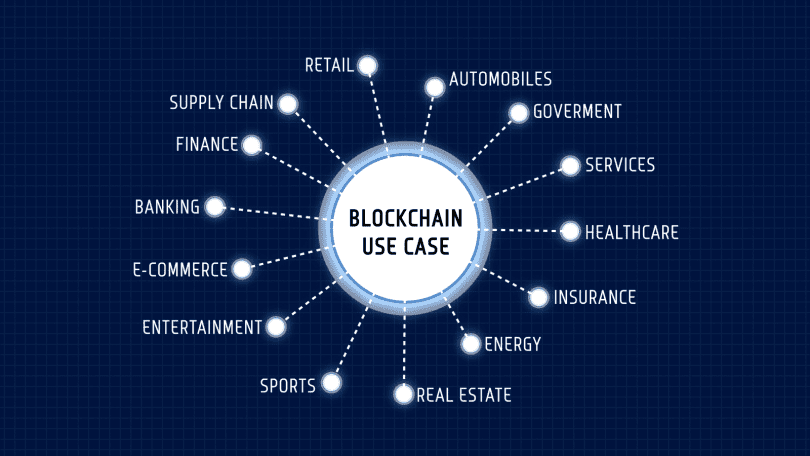
Blockchain Applications
Blockchain isn’t only used for financial transactions. Due to its secure and transparent nature, the technology is versatile to needs beyond one area of expertise. Industries covering energy, logistics, education and more are utilizing the benefits of blockchain every day.
Top Blockchain Uses & Applications
- Cryptocurrency
- Cybersecurity
- Accounting and record keeping
- Supply chain
- Healthcare
Cryptocurrency: Blockchain vs Cryptocurrency
Blockchain’s most well-known use (and maybe most controversial) is in cryptocurrencies. Cryptocurrencies are digital currencies (or tokens), like Bitcoin, Ethereum or Litecoin, that can be used to buy goods and services. Just like a digital form of cash, crypto can be used to buy everything from your lunch to your next home. Unlike cash, crypto uses blockchain to act as both a public ledger and an enhanced cryptographic security system, so online transactions are always recorded and secured.
The term Bitcoin, for example, is used interchangeably to refer to both the blockchain and the cryptocurrency, but they remain as two separate entities. The very first blockchain application appeared in 2009 as Bitcoin, a crypto system using the distributed ledger technology. This also marked Bitcoin as the first “blockchain.” The aspect of blockchain being used to house this new digital currency is what brought both entities into association, and what led them quickly into the spotlight. The Bitcoin blockchain describes only the technology in which the currency is housed, while the Bitcoin cryptocurrency describes only the currency itself.
How Does Cryptocurrency Work?
Cryptocurrencies are digital currencies that use blockchain technology to record and secure every transaction. A cryptocurrency (Bitcoin, for example) can be used as a digital form of cash to pay for everyday items as well as larger purchases, like cars and homes. It can be bought using one of several digital wallets or trading platforms, then digitally transferred upon purchase of an item, with the blockchain recording the transaction and the new owner. The appeal of cryptocurrencies is that everything is recorded in a public ledger and secured using cryptography, making an irrefutable, timestamped and secure record of every payment.
To date, there are more than 20,000 cryptocurrencies in the world that have a total market cap around $1 trillion, with Bitcoin holding a majority of the value. These tokens have become incredibly popular over the last few years, with the value of one Bitcoin fluctuating between several thousands of dollars.
Here are some of the main reasons behind cryptocurrency’s recent popularity:
- Blockchain’s security makes theft much harder since each cryptocurrency has its own irrefutable identifiable number that is attached to one owner.
- Crypto reduces the need for individualized currencies and central banks. With blockchain, crypto can be sent to anywhere and anyone in the world without the need for currency exchanging or without interference from central banks.
- Cryptocurrencies can make some people rich. Speculators have been driving up the price of crypto, especially Bitcoin, helping some early adopters to become billionaires. Whether this is actually a positive has yet to be seen, as some retractors believe that speculators do not have the long-term benefits of crypto in mind.
- More and more large corporations came around to the idea of a blockchain-based digital currency for payments. In February 2021, Tesla announced that it would invest $1.5 billion into Bitcoin and accept it as payment for their cars.
Of course, there are many legitimate arguments against blockchain-based digital currencies. First, crypto isn’t a very regulated market. Many governments were quick to jump into crypto, but few have a staunch set of codified laws regarding it. Additionally, crypto is incredibly volatile due to speculators. Lack of stability has caused some people to get very rich, while a majority have still lost thousands of dollars.
Whether or not digital currencies are the future remains to be seen. For now, it seems as if blockchain’s meteoric rise is more starting to take root in reality than pure hype. Though it’s still making headway in this entirely-new, highly-exploratory field, blockchain is also showing promise beyond Bitcoin.
What Is a Blockchain Platform?
While a blockchain network describes the distributed ledger infrastructure, a blockchain platform describes a medium where users can interact with a blockchain and its network. Blockchain platforms are created to be scalable and act as extensions from an existing blockchain infrastructure, allowing information exchange and services to be powered directly from this framework.
An example of a blockchain platform includes Ethereum, a software platform which houses the Etherium, or ether, cryptocurrency. With the Ethereum platform, users can also create programmable tokens and smart contracts which are built directly upon the Ethereum blockchain infrastructure.
Beyond Bitcoin: Ethereum Blockchain
Originally created for Bitcoin to operate on, blockchain has long been associated with cryptocurrency, but the technology’s transparency and security has seen growing adoption in a number of areas, much of which can be traced back to the development of the Ethereum blockchain.
In late 2013, Russian-Canadian developer Vitalik Buterin published a white paper that proposed a platform combining traditional blockchain functionality with one key difference: the execution of computer code. Thus, the Ethereum Project was born.
Today, the Ethereum blockchain lets developers create sophisticated programs that can communicate with one another through the blockchain itself.
Similarly to Bitcoin, it’s worth noting that the Ethereum blockchain and the Ethereum cryptocurrency are two separate entities.
Tokens
Ethereum programmers can create tokens to represent any kind of digital asset, track its ownership and execute its functionality according to a set of programming instructions.
Tokens can be music files, contracts, concert tickets or even a patient’s medical records. In the past couple of years, non-fungible tokens (NFTs) grew in popularity. NFTs are unique blockchain-based tokens that store digital media (like a video, music or art). Each NFT has the ability to verify authenticity, past history and sole ownership of the piece of digital media. NFTs have become wildly popular because they offer a new wave of digital creators the ability to buy and sell their creations, while getting proper credit and a fair share of profits.
Newfound uses for blockchain have broadened the potential of the ledger technology to permeate other sectors like media, government and identity security. Thousands of companies are currently researching and developing products and ecosystems that run entirely on the burgeoning technology.
Blockchain is challenging the current status quo of innovation by letting companies experiment with groundbreaking technology like peer-to-peer energy distribution or decentralized forms for news media. Much like the definition of blockchain, the uses for the ledger system will only evolve as technology evolves.
Smart Contracts
What is a smart contract? These are digital, programmed contracts that automatically enact or document relevant events when specific terms of agreement are met. Each contract is directly controlled through lines of code stored across a blockchain network. So once a contract is executed, agreement transactions become trackable and unchangeable. Though fundamental to the Ethereum platform, smart contracts can also be created and used on blockchain platforms like Bitcoin, Cardano, EOS.IO and Tezos.
Blockchain Applications for Industries
As mentioned, blockchain technology is being used far beyond just its roots in cryptocurrency — almost every modern industry is being morphed by the technology in some way.
Alongside banking and finance, blockchain is revolutionizing healthcare, record-keeping, smart contracts, supply chains and even voting. While the capabilities of such technology continue to grow, all the possible applications of blockchain are very much yet to be discovered.

